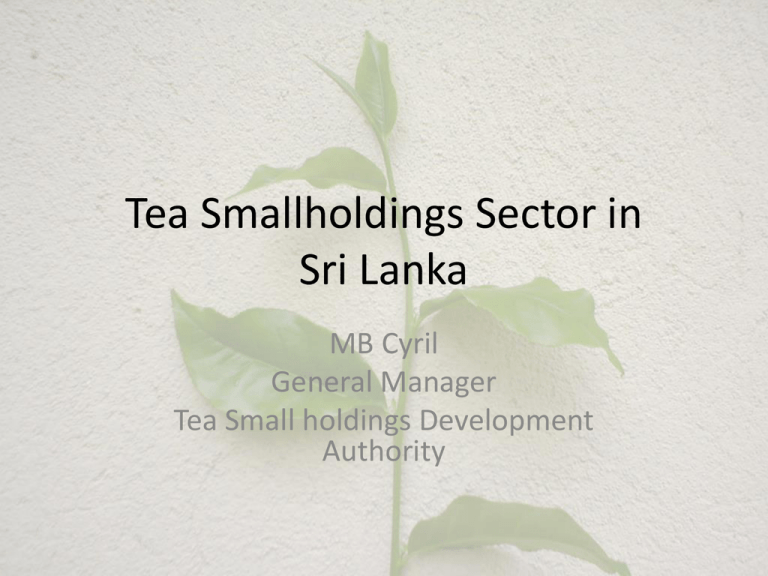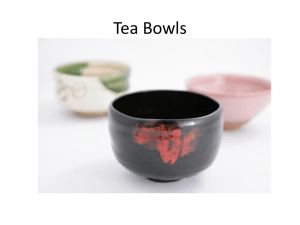Tea Smallholdings Sector in Sri Lanka MB Cyril General Manager
advertisement

Tea Smallholdings Sector in Sri Lanka MB Cyril General Manager Tea Small holdings Development Authority Outline • • • • Current status of the sector Smallholder profile Community initiatives Issues Tea Smallholding • Holding less than 10 Acres (4 Ha) where tea is grown for the purpose of converting to made tea Distribution in the Island Significance in the Economy • Share a three quarter production in the country that still the major FE earning agricultural activity in terms of green leaf • Supports livelihood of 400,000 families of a total population of approx 2 Mn, nearly 10% of the total population. • Employs half a Mn people in rural Ag sector Extent and Production Extent Production 28% 41% 59% Smallholdings Other 72% Smallholdings Other Extent of Tea by Size of holding 4% 5% 11% Less than 1/2 Ha 4% 51% 8% 1/2- < 1 1-< 2 2- <3 17% 3- < 5 5- < 10 10 and above More than half of the total extent is in holdings less than 0.5 ha Percentage of Holdings by Size 0.58% 0.36% 0.21% 1.99% 0.16% 8.52% Less than 1/2 Ha 1/2- < 1 1-< 2 2- <3 88.19% 3- < 5 5- < 10 10 and above Larger majority of the small holdings are of the size less than 0.5 ha Expansion of the Smallholdings 140000 120000 100000 80000 60000 40000 20000 0 1933 Total 1933 26007 1969 1969 42034 1975 1975 45281 1980 1994 2006 1980 52085 1994 82969 2006 116492 2013 2013 121267 Production Trend in the Smallholdings 300 250 Production Kg Mn 200 150 100 50 0 Total 1985 82 1990 114 1995 140 2000 184 2005 206 2010 230 2013 244 Share Trend of Smallholder Production Production Share 80 70 Percentage 60 50 40 30 20 10 0 1985 1990 1995 2000 2005 2010 2013 Expansion of Small Holdings Census 1980 • Holdings 159,865 • Extent Ha 75,769 Census 1994 • Holdings 206,652 • Extent Ha 82,918 Census 2005 • Holdings 350,982 • Extent Ha 116,492 % Increase • 120 % • 54.5% No of Small holders by status of ownership Single ownership • 64.9% Joint ownership • 7.1% Govt Rented • 12.4% Private Rented • 2.5% Encroachment/Illicit • 8.2% Majority of smallholders enjoy single ownership over heir land Disposal of Green Leaf Direct to Factory • 33.7% Green leaf dealer/ Collector • 51.8% Tea Society • 6.9% Any other/ Unspecified • 7.6% Larger share of green leaf is handled by the collectors/ Dealers Results of Sample Survey,2008 Characteristics of tea smallholders • Tea is main source of income of 50% of smallholders • 56% reside in the tea holding and 35% are not in the holding but else where in the same village, another 6% resides out side • 86% possess permanent dwellings and 7% semi permanent,3% reported to be temporary dwellings • Only 5% have obtained bank loan facilities during preceeding 5 Years, Results of sample survey, 2008, Cont’d Characteristics of smallholdings, • 78% is under VP and 12% under seedling tea • 92% of holdings are planted with cultivars of 1980s, TRI 2000 series • Estimated average productivity was 1788Kgs made tea/ ha/yr • 32% of the holdings are in mixed crops, 15% with other minor export crops and 14% with coconut. • 56% maintain rounds of a week or seven days and 26%, 8-10 intervals. another 16% maintain rounds more than 10 days owing to low yields Social Organisation of small holders • Voluntary organisation in 1969 as leaf collecting societies • Forming in to societies in 1989 and institutionalising under the provisions of the Tea Smallholdings Development Act, amendment in 1991 • Confer legality to these societies in 1997 under an amendment of the above act • Recognition by constitution, representation in decision making in all tea related institutions. Society hierarchy Federation of tea small holder societies National level District/ Regional level (8) Local level (1350) Regional Organization Village Society Village Society Regional Organization Village Society Village Society Institutional/ Organizational Relationship Federation of Tea Smallholder Societies. Board of Management of Tea Smallholdings Development Authority District/ Regional Organization Regional Office of the TSHDA Village Tea Smallholdings Development Society Tea Inspector/Extension officer Role/ Responsibilities of Smallholder Societies • Provision of Services to membership Operating leaf collection, Supplying Fertilizer, other welfare services • Organizing Extension work in the field, directly linked to Extension Delivery Government Assistance • Tea Planting Subsidies in Cash and Kind to cover 25% of the cost • Fertilizer Subsidy to cover 75% of cost • Technology transfer through Extension – Research and extension dialogue ( with the research organization) – Mechanization Initiatives • Livelihood support for lowest category of income. Research Extension Linkages • Regional Technical Extension Forum (RTE) • TRI , TSHDA Linkage Meeting (National level) • Experiment and Extension Forum(National level) • TOT for Extension Staff by TRI Scientists • Joint Field Extension Services Small holder position in the value chain Small holder produce r $ 2 -3/ Kg Processin g Unit manufact urer Broker/ Auction sales $ 3- 4/ Kg Tea Board Regulation Buyer/ Trader/ Shipper Importer/ Buyer/Tra der Retailer/ supermar ket store $20-30 /Kg Issues • • • • Unsecured price structure Narrowing margin of the production Facing adverse weather conditions Dearth of labour Smallholder Model Thank you



